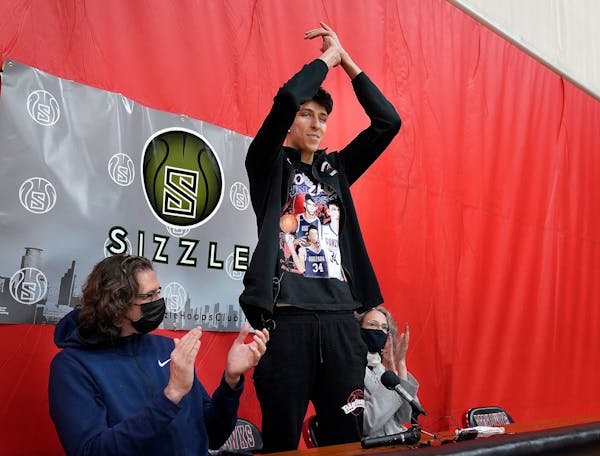Jalen Suggs left the state of Minnesota to play college basketball at Gonzaga, then declared for the NBA draft after his freshman season on the same day that Chet Holmgren, his old Minnehaha Academy teammate, committed to Gonzaga.
Somehow, recruiting is a closed circle if you are a small, private school in a town nobody would visit without a book or a basketball, and yet if you're a Big Ten school in a certain big city, recruiting your state's most talented players seems harder than itemizing taxes.
The flow of basketball talent from our West River Parkway to Spokane's Lake Arthur would be disturbing if it hadn't become predictable.
As new Gophers men's basketball coach Ben Johnson sets up his University of Minnesota computer password ("NotPitino" is my guess), he faces two challenges as an inexperienced head coach whose strength should be recruiting Minnesota kids:
1. He needs to get more of the state's top recruits to stay home, and in this case "more" is synonymous with "any."
2. He needs to get a higher percentage of the state's recruits who will become quality four-year players, as opposed to the one-and-doners like Suggs. McKinley Wright, Dawson Garcia and Reid Travis belong in this category.
If a young player grows up wanting to go to Duke and is good enough to be recruited by Duke, Johnson and the Gophers may be out of luck. But Johnson has two attributes that could help him land more quality Minnesotans than his predecessors.
First, a reminder of who his predecessors were and what they lacked, starting with Clem Haskins.
Haskins was an excellent coach and a strong recruiter because he knew what kind of player would perform best in his system, and he wasn't afraid to take a strong young athlete and teach him to play basketball over four or five years. But he cheated.
Dan Monson, the other Minnesota-Gonzaga basketball connection, was hired to replace Haskins, rebuild a program decimated by NCAA sanctions and win without cheating. He's a pretty good coach and went to one NCAA tourney but never fell in love with living or working in Minnesota. So it's not much of a reach to suggest that he wasn't enamored with driving on black ice to watch AAU tournaments during Minnesota Februaries to scout promising seventh-graders.
After Monson was fired, the Gophers allowed Tubby Smith to hire them as his next school. Smith is a Hall of Fame coach, but if his top priority had been winning college basketball games he would have stayed at Kentucky. At Minnesota, he bolstered his reputation as a strong defensive coach and legitimized his Kentucky-born reputation as someone who didn't seem interested in energetic recruiting or modernizing his offense.
After disgraced athletic director Norwood Teague fired Smith, Teague realized he had overestimated his ability to hire a quality coach and settled for Pitino, who had been a head coach for one year, at Florida International. Pitino made it to two NCAA tourneys and won one tournament game, but his team imploded last season and he was fired.
Pitino had one thing in common with Monson and Smith: A lack of passion for grassroots Minnesota recruiting.
It's not that Monson, Smith and Pitino didn't want to land good Minnesota players, or that they never succeeded in that regard. It's that they viewed themselves as coaches more than recruiters. All three enjoyed family life and would rather have dinner with his wife than chase a preteen. That's an understandable preference, and a good way to get fired at the University of Minnesota.
They weren't going to win over a local recruit with sheer enthusiasm and eye-to-eye persistence. That's where Johnson will have to excel, and he seems to know that. He and assistant coach Dave Thorson, an assistant at the U in the '90s before a two-decade run at DeLaSalle, are known for their raw energy and Minnesota connections.
Johnson will work the AAU circuit, and his high school connections. He will scour the transfer portal for anyone who might be a fan of Prince or the Vikings. He and Thorson will sell Minnesota and Williams Arena, and unlike some of their predecessors, they might even believe what they're saying.

Souhan: Why Tiger Woods should keep swinging
Souhan: Scheffler wins Masters again, shows what makes him special
Morikawa falters in final round at Masters

Keeping up with the Joneses who helped design Augusta National's classic back nine


